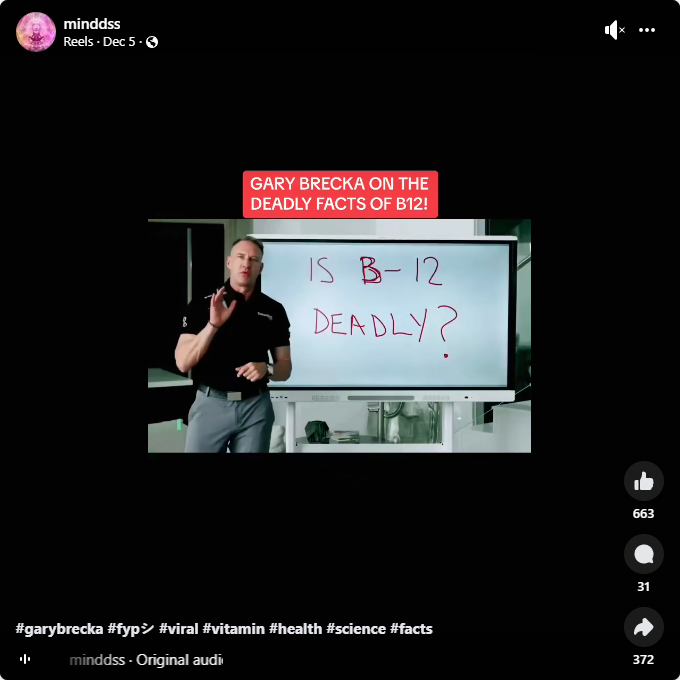
Is the cyanocobalamin found in B12 supplements harmful to humans? No, that's not true: Cyanocobalamin is a synthetic form of vitamin B12 used to treat vitamin deficiencies; it is converted into active forms of B12 in the body. The small amount of cyanide released during this process is negligible and not harmful, a nutritional expert told Lead Stories.
The claim appeared in a video and post on Facebook by minddss on December 5, 2023, under the title "GARY BRECKA ON THE DEADLY FACTS OF B12." It opened:
IS B-12 DEADLY?
This is what the post looked like on Facebook at the time of writing:
(Source: Facebook screenshot taken on Thu Feb 22 16:30:48 2024 UTC)
The video
During the 90-second clip, Gary Brecka, who identifies himself as a "human biologist" and who holds bachelor of science degrees in biology and human biology according to his LinkedIn profile, lays out his case that cyanocobalamin, a form of B12, is harmful to humans. Here's a full transcript of the video:
What I'm about to tell you about vitamin B12 may blow your mind. My name is Gary Brecka. I'm a human biologist and researcher. And I'm here to talk about vitamin B12, which is one of the most important compounds in the human body.
Remember B12 is a metal. We call it the cobalt metal. Now, when we put this metal into the human body, which is very necessary, we call it cobalamin. But there's three types of this cobalamin molecule that occur naturally in nature. One of them we make synthetically on our own.
Believe it or not, we make this vitamin out of hydrogen cyanide and the cobalt metal and we put this into vitamins that you are likely taking right now. Some of you are actually taking vitamins that are not only hurting your DNA and stealing vital nutrients from your cells, but they are robbing your body of vital oxygen and other light metals that are necessary for human function.
I want you to look for this on the back of your vitamin labels and if it is on the back of your vitamins, I want you to throw those vitamins in the trash. It's called the, it's the only form of B12 that is not occurring naturally in nature. It is called cyano, cyano ... cobalamin. Cyanocobalamin.
Sort of running out of room there. Cyano is short for cyanide. Don't believe me? A lot of people don't, so I'm taking you to the U.S. government's website at the National Library of Medicine at the National [ends abruptly]
Cyanocobalamin
Cyanocobalamin is a synthetic form of vitamin B12 used to treat vitamin deficiencies that is approved by the Food and Drug Administration. It is also the most common form of vitamin B12 in dietary supplements.
Nutrition experts
Lead Stories reached out to Dr. Joel Mason, leader of the Vitamins and Carcinogenesis Team at the Jean Mayer USDA Human Nutrition Research Center on Aging at Tufts University, to address Brecka's claims in the video.
In a February 22, 2024, email response, he stated that cyanocobalamin is not harmful to humans. Mason also refuted the allegation that this form of B12 is made from hydrogen cyanide and cobalt. He said it's not:
It is made from potassium cyanide not hydrogen cyanide. Cobalt is an integral component of natural B12 as well and can only be toxic at doses far in excess of what a B12 supplement contains. There is absolutely no cause for concern.
Mason said it is true that there's a tiny amount of cyanide in cyanocobalamin, but less than what we get in many things we already eat. He continued:
The amount of cyanide is far, far below any level that would cause harm: even a large supplement of B12 would expose a person to less than 2% of what is considered to be the minimal dose that could cause any harm. Indeed, a serving of flax seeds, fresh apple juice or apricots contains more cyanide.
Additionally, Mason said there's "no scientific evidence" that cyanocobalamin hurts a person's DNA.
Nebraska Medicine nutrition therapist Kimberly Sharp also told Lead Stories in a February 22, 2024, email that cyanocobalamin is not generally harmful to humans. She said:
There is the chance of some adverse side effects or hypersensitivity. Hypokalemia (low levels of potassium. can occur, especially when first starting treatment. Being sensitive to cobalt can risk an allergic reaction).
With that being said, one cannot overdose on cyanocobalamin. If one is provided with a higher dose, it is secreted rapidly in urine
Sharp said the same goes for the amount of cyanide in this form of B12:
A cyanide group is present in cyanocobalamin. However, there is little enough present to definitely not be a risk to human health - even at a really high dose.
And Sharp echoes Mason in saying that cyanocobalamin is no threat to a person's DNA:
This is simply not true. Vitamin B12 is actually essential for DNA synthesis and energy production.
Sharp explained that cyanocobalamin is preferred over other forms of B12 due to its cost-effectiveness and longer shelf life. She recommends talking to a registered dietitian nutritionist or primary care physician for additional questions.
Pseudoscience
Joe Schwarcz, director of the McGill University Office for Science and Society, which is tasked with "Separating Sense from Nonsense," wrote an article in August 2022 debunking similar claims by Brecka about B12 in children's vitamins. Titled "Oh My, There is Cyanide in B12 Supplements. Really.," the subtitle reads, "The amount of cyanide in B12 supplements isn't a cause for concern. The real concern is misleading pseudoexperts."
In a February 22, 2024, email to Lead Stories, Schwarcz had this to say about Brecka:
The old saying, 'follow the money,' often rings true when looking for motives to spread pseudoscientific detritus. That I think is the case with this anti-cyanocobalamin snake oil salesman who claims to be a 'renowned human biologist.' Maybe in his own mind.
He makes bins of money by selling dietary supplements and ridiculous genetic tests by capitalizing on scientific illiteracy.
Read more
Additional Lead Stories fact checks of claims about vitamins and supplements can be found here.















